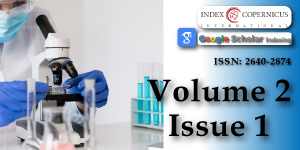Amyotropyc Lateral Sclerosis and Endogenous -Esogenous Toxicological Movens: New model to verify other Pharmacological Strategies
Main Article Content
Abstract
In 1874 J.M. Charcot was the first to describe ALS amyotrophic lateral sclerosis, a disease with an high non response therapy rate also to the actual therapy.
ALS is not clearly associate to only single etio-patogenetic movens but many process seem involved.
Also the strange geographic diffusion of different forms contribute to a complex syndromic pathology.
The introducing of new theories and approach can help to find more efficacy therapeutic strategies.
In this work the different neuronal damage movens and new therapeutic strategies are analyzed to produce a Unic global response to the pathologic process useful in next clinical application.
Genetic factors must be considered also added to environmental movens but also to the endogenous microenvironment of motoneuron involved.
A toxicological-biochemical-imunological approach can be useful tool to find new therapeutic strategies.
Or to improve local availability of pharmacological molecules.
Article Details
Copyright (c) 2018 Luisetto M, et al.

This work is licensed under a Creative Commons Attribution 4.0 International License.
Lyon M, Wosiski-Kuhn M, Gillespie R, Caress J, Milligan C. Inflammation, Immunity and ALS: Etiology and Pathology. Muscle Nerve. 2018; Ref.: https://goo.gl/WE79i4
Volk AE, Weishaupt JH, Andersen PM, Ludolph AC, Kubisch C. Current knowledge and recent insights into the genetic basis of amyotrophic lateral sclerosis. Med Genet. 2018; 30: 252-258. Ref.: https://goo.gl/nkpX3J
Di Pietro L, Lattanzi W, Bernardini C. Skeletal Muscle MicroRNAs as Key Players in the Pathogenesis of Amyotrophic Lateral Sclerosis. Int J Mol Sci. 2018; 19. pii: E1534. Ref.: https://goo.gl/D8iWAf
Baskaran P, Shaw C, Guthrie S. TDP-43 Causes neurotoxicity and cytoskeletal dysfunction in primary cortical neurons. PLoS One. 2018; 13: e0196528. Ref.: https://goo.gl/KTHGCu
Deng B, Lv W, Duan W, Liu Y, Li Z, et al. Progressive Degeneration and Inhibition of Peripheral Nerve Regeneration in the SOD1-G93A Mouse Model of Amyotrophic Lateral Sclerosis. Cell Physiol Biochem. 2018; 46: 2358-2372. Ref.: https://goo.gl/eiLgXN
Nguyen DKH, Thombre R, Wang J. Autophagy as a common pathway in amyotrophic lateral sclerosis. Neurosci Lett. 2018; pii: S0304-3940(18)30261-1. Ref.: https://goo.gl/jrRgyG
Mammana S, Fagone P, Cavalli E, Basile MS, Petralia MC, et al. The Role of Macrophages in Neuroinflammatory and Neurodegenerative Pathways of Alzheimer's Disease, Amyotrophic Lateral Sclerosis, and Multiple Sclerosis: Pathogenetic Cellular Effectors and Potential Therapeutic Targets. Int J Mol Sci. 2018;19: pii: E831. Ref.: https://goo.gl/8NgdcH
Shin JH, Lee YA, Lee JK, Lee YB, Cho W, et al. Concurrent blockade of free radical and microsomal prostaglandin E synthase-1-mediated PGE2 production improves safety and efficacy in a mouse model of amyotrophic lateral sclerosis. J Neurochem. 2012; 122: 952-561. Ref.: https://goo.gl/piQZ6a
Okumura H. Epidemiological and clinical patterns of western pacific amyotrophic lateral sclerosis (ALS) in Guam and sporadic ALS in Rochester, Minnesota, U.S.A. and Hokkaido, Japan: a comparative study. Hokkaido Igaku Zasshi. 2003; 78: 187-195. Ref.: https://goo.gl/SqCzwP
Takeda T. Possible concurrence of TDP-43, tau and other proteins in amyotrophic lateral sclerosis/frontotemporal lobar degeneration. Neuropathology. 2018; 38: 72-81. Ref.: https://goo.gl/yCH5f6
Pansarasa O, Bordoni M, Diamanti L, Sproviero D, Gagliardi S, et al. SOD1 in Amyotrophic Lateral Sclerosis: "Ambivalent" Behavior Connected to the Disease. Department of Neurology, Tokyo Women's Medical University, Tokyo, Japan. Int J Mol Sci. 2018; 19. pii: E1345. Ref.: https://goo.gl/PJSLCz
Oeckl P, Weydt P, Steinacker P, Anderl-Straub S, Nordin F, et al. Different neuroinflammatory profile in amyotrophic lateral sclerosis and frontotemporal dementia is linked to the clinical phase. J Neurol Neurosurg Psychiatry. 2018; pii: jnnp-2018-318868. Ref.: https://goo.gl/ny5pT4
Patai R, Nógrádi B, Meszlényi V, Obál I, Engelhardt J, et al. [Calcium ion is a common denominator in the pathophysiological processes of amyotrophic lateral sclerosis]. Ideggyogy Sz. 2017; 70: 247-257. Ref.: https://goo.gl/2A5B1P
Manabe Y, Kashihara K, Shiro Y, Shohmori T, Abe K. Enhanced Fos expression in rat lumbar spinal cord cultured with cerebrospinal fluid from patients with amyotrophic lateral sclerosis.Neurol Res. 1999; 21: 309-312. Ref.: https://goo.gl/UsqiAV
Luisetto M.Intra- Local Toxicology Aspect Time Related in Some Pathologic Conditions. Open Acc J of Toxicol. 2017; 2: 555586. Ref.: https://goo.gl/8j5M41
Luisetto M, Nili-Ahmadabadi B, Mashori GR, Yesvi A, Sahu RK. Brain and immune system: KURU disease a toxicological process? J Neurosci Neurol Disord. 2018; 2: 014-027. Ref.: https://goo.gl/zzeCN3
Case AJ. On the Origin of Superoxide Dismutase: An Evolutionary Perspective of Superoxide-Mediated Redox Signaling. Antioxidants (Basel). 2017; 6. pii: E82. Ref.: https://goo.gl/rMYNLH
Nazıroğlu M, Muhamad S, Pecze L. Nanoparticles as potential clinical therapeutic agents in Alzheimer's disease: focus on selenium nanoparticles. Expert Rev Clin Pharmacol. 2017; 10: 773-782. Ref.: https://goo.gl/ipcBbm
Adebayo OL, Adenuga GA, Sandhir R. Selenium and zinc protect brain mitochondrial antioxidants and electron transport chain enzymes following postnatal protein malnutrition. Life Sci. 2016; 152: 145-155. Ref.: https://goo.gl/MCs1mB
Ravits JM, La Spada AR. ALS motor phenotype heterogeneity, focality, and spread: deconstructing motor neuron degeneration. Neurology. 2009; 73: 805-811. Ref.: https://goo.gl/r4mPbA
McGeer PL, Steele JC. The ALS/PDC syndrome of Guam: potential biomarkers for an enigmatic disorder. Prog Neurobiol. 2011; 95: 663-669. Ref.: https://goo.gl/hcVWp4
Muyderman H, ChenT. Mitochondrial dysfunction in amyotrophic lateral sclerosis – a valid pharmacological target? Br J Pharmacol. 2014; 171: 2191–2205. Ref.: https://goo.gl/GFmpqB
Zarei R, Carr K, Reiley L, Diaz K, Guerra O, et al. A comprehensive review of amyotrophic lateral sclerosis. Surg Neurol Int. 2015; 6: 171. Ref.: https://goo.gl/qAk68k
Kasinathan N, Jagani HV, Alex AT, Volety SM, Rao JV. Strategies for drug delivery to the central nervous system by systemic route. Drug Deliv. 2015; 22: 243-257. Ref.: https://goo.gl/5SCGtQ
Sharma U, Badyal PN, Gupta S. Polymeric Nanoparticles Drug Delivery to Brain: A Review. Int J Pharmacol Pharm Sci. 2015 2: 5; 60-69. Ref.: https://goo.gl/Kdsjha
Küry P, Nath A, Créange A, Dolei A, Marche P. et al. Human Endogenous Retroviruses in Neurological Diseases. Trends Mol Med. 2018; 24: 379-394. Ref.: https://goo.gl/Y4zq5F
Hanson LR, Frey WH. Intranasal delivery bypasses the blood-brain barrier to target therapeutic agents to the central nervous system and treat neurodegenerative disease. BMC Neurosci. 2008; 9(Suppl 3): S5. Ref.: https://goo.gl/snHWGK
Jia Liu, Wang F. Role of Neuroinflammation in Amyotrophic Lateral Sclerosis: Cellular Mechanisms and Therapeutic Implications. Front. Immunol. 2017; 8: 1005. Ref.: https://goo.gl/XLkSoQ

